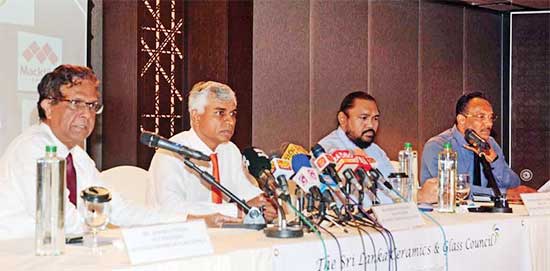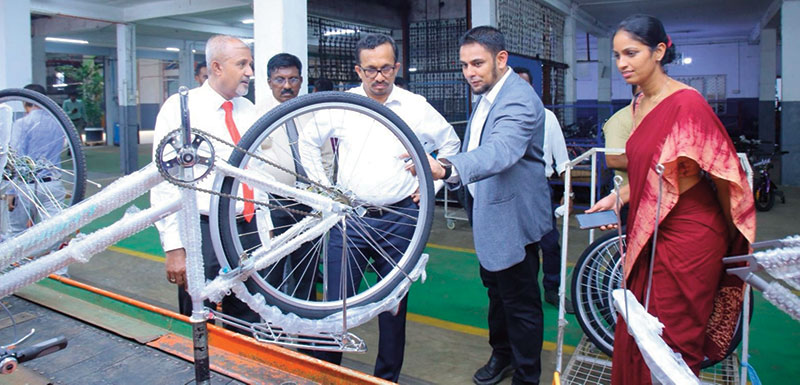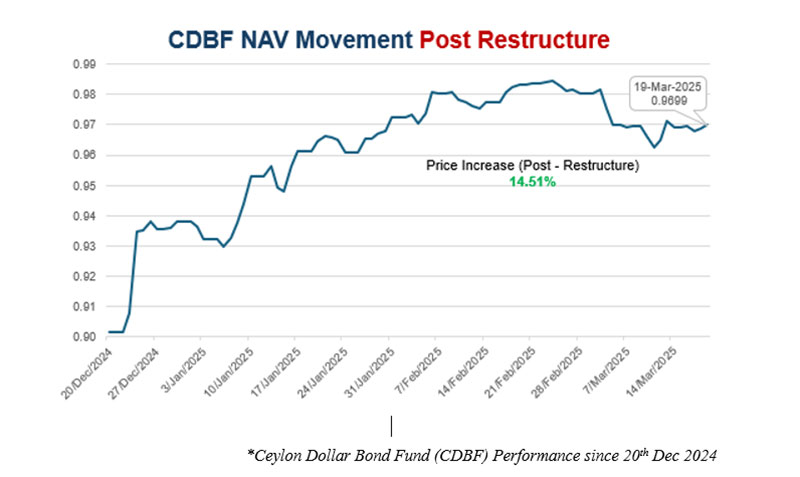Business
We become importers or manufacturers depending on govt policy: industrialists

From left: SLCGC Vice President Aravinda Perera, SLCGC Vice President Mahendra Jayasekera, SLGCC president Anura Warnakulasooriya and SLCGC Member S.H.B. Karunaratne
SL Customs ‘text book’ not in line with President’s vision on Production Economy, they say
by Sanath Nanayakkare
A leading local ceramics products manufacturer and member of Sri Lanka Ceramics and Glass Council told the media recently that their members choose to become manufacturers or importers depending on the policy of the government of the day.
“If we find it more profitable to import and sell due to policy decisions, we import. If we see the policy environment in Sri Lanka is conducive to manufacturing locally, we manufacture. We interchange our roles according to policy framework of the government”, he said.
Member of Sri Lanka Ceramics and Glass Council S.H. B. Karunaratne whose company’s product range is exported to about 47 countries made these remarks while speaking at a press conference organised by the Council to voice a ‘major weakness’ in Sri Lanka Customs’ Valuation Book which ‘unfairly’ favours importers of ceramic bathware, glass ware and allied products making things hard for local manufacturers.
“We do believe in free trade which is a two-way street and we can successfully face competition offered by foreign products. But the current valuation for invoicing by Sri Lanka Customs is so skewed and heavily favours importers and doesn’t create a level playing for competent local manufacturers who have invested heavily in the industry. This is not fair and it needs to be rectified,” he said.
“President Gotabaya Rajapaksa’s national policy framework of Vistas of Prosperity and Splendour has created a conducive environment for local production, therefore, we are encouraged to remain as manufacturers”.
“Some social media posts claim that only Rocell makes bathroom sets in Sri Lanka and they produce their goods for individuals of upper-income class and big projects. The truth is not only Rocell but Auto Bathware, RSL Ceramics, Hega, Embilipitiya Ceramics also make complete bathroom sets on a bigger scale and several other companies on a smaller scale. That’s why there was no scarcity of products despite the ban on imports.. Our manufacturers are not producing 100% of the local market requirement. But because of the government’s policy, we have planned to invest Rs.2-3 billion in the near term. With these investments our 60% local production would increase to100% and we will be self-sufficient in ceramic products in two years. And we have our own transparent pricing system to make sure local consumers have access to local products of good quality at affordable prices according to their choice”.
“The main issue that discourages potential manufacturers and existing national manufacturers is that the Customs valuation book value for imported items is at a low and unrealistic rate. To import a complete set of ceramic bathware which weighs 65kgs and includes a commode, tank, basin, pedestal, seat cover and water fitting, the book value for invoicing stands at US$35.00 or Rs.6,350. This is an unrealistic amount as a complete set of ceramic bathware cannot be manufactured at such a low cost, because to purchase the seat cover and water fitting alone it costs Rs. 3,500”.
Suggesting a solution to the issue he said,” This issue can be corrected by amending the Custom’s ‘text book’ value to US$100. Once this is amended local manufacturers will be able to compete with imports and it will also prevent cheap inferior quality items being dumped in our country. And this will also help to stop the huge outflow of foreign exchange.
“Once this book value is amended to $100, the importers and local manufactures will have to compete on a level playing field, and this will in turn benefit the consumer as they can get a competitive price”.
When asked if their members have voiced their concern with the authorities on the ‘unfair’ valuation method by Sri Lanka Customs, Karunaratne said that they would be meeting Prime Minister Mahinda Rajapaksa to discuss the matter at an upcoming meeting.
Business
Industry and Entrepreneurship Development Minister Handunneththi’s visit to Lumala highlights key industrial concerns

With the aim of assesing the current challenges faced by local industrialists and explore avenues for government support, Minister of Industry and Entrepreneurship Development Hon. Sunil Handunneththi visited City Cycle Industries Manufacturing (Pvt.) Ltd., widely known as Lumala, on March 24 at its factory in Panadura.
During the visit, Minister Handunneththi engaged with senior officials and employees to understand their concerns and operational difficulties. In a statement shared on social media, the Minister acknowledged the pressing challenges affecting Sri Lanka’s manufacturing sector and emphasized the government’s commitment to providing swift and effective solutions.
Minister Handunneththi further reiterated the government’s intent to position local manufacturers as key stakeholders in Sri Lanka’s economy by addressing regulatory hurdles, market imbalances, and supply chain constraints.
The visit comes amid growing concerns from Lumala employees and management regarding the state of Sri Lanka’s bicycle manufacturing industry, in the backdrop of facing significant challenges, including an influx of imported bicycles and components that circumvent regulatory checks. In addition, the high taxes on raw materials used in local manufacturing has further exacerbated production costs, making it difficult for domestic manufacturers to remain competitive.
Earlier this year, Lumala employees called for urgent government intervention to address these challenges, warning that ongoing financial strain could lead to further shutdowns of critical production units, job losses, and setbacks to the broader industrial ecosystem. With a local value addition of 50-70 percent verified by the Ministry, its workforce remains hopeful that government action will help achieve an ethical manufacturing industry.
Lumala, a household name in Sri Lanka’s bicycle industry, has been a key player in sustainable mobility solutions for over 35 years. The company was recently honored with the Best National Industry Brand award under the Large-Scale Other Industry Sector category at the National Industry Brand Excellence Awards 2024.
With a production capacity of 2,000 bicycles per day and a workforce of 200, Lumala continues to cater to both domestic and international markets, producing a diverse range of bicycles, electric bikes and light electric vehicles. In line with Sri Lanka’s goal to expand forest cover to 32 percent by 2030 and cut GHG emissions by 14.5%, Lumala is actively contributing to this mission—both as a company and through its diverse range of products.
As Sri Lanka works towards strengthening its local manufacturing sector, Minister Handunneththi’s visit signals a crucial step toward addressing industrial concerns and reinforcing government support for sustainable and competitive domestic production.
Business
New SL Sovereign Bonds win foreign investor confidence

Sri Lanka’s country rating was upgraded from ‘Restricted Default’ to ‘CCC’ following the successful exchange for the new International Sovreign Bonds (SL ISBs) during December 2024. The three types (03) of exciting new sovereign bonds have restored foreign investor confidence.
The Central Bank of Sri Lanka (CBSL) has performed a remarkable role in guiding the economy out of default status and restored economic stability, and gained Sri Lanka a non-default Country Rating of ‘CCC’. Among the key achievements of CBSL, have been to reduce treasury interest rates under 9% and stabilize the currency while rebuilding foreign reserves to $ 6Bn.
SL offers four Macro Linked Bonds (MLBs) linked to GDP growth, a Governance Linked Bond (GLB) and a short term, Fixed Coupon Bond for unpaid Past Due Interest (PDI). The MLBs offer variable returns depending on SL’s GDP growth from 2024 to 2027, (e.g. haircuts can vary between 16% to 39%). The GLB interest can vary depending on meeting 15.3% and 15.4% of Total Revenue/ GDP thresholds in 2026 and 2027 respectively. The PDI bond offers a fixed coupon of 4% until 2028 and trades at around $94.
This combination of unique, variable returns offers global investors an exciting opportunity to capitalize on SL’s economic revival and US interest rate movements. Sri Lanka’s economic resurgence in 2024 was promising, with a 5% GDP growth rate. With improving investor confidence, SL ISB daily turnover now exceeds $10mn.
The Ceylon Dollar Bond Fund (CDBF) is the only USD Sovereign Bond Fund that is exclusively invested in SL ISBs with Deutsche Bank acting as the Trustee and Custodian Bank. The Fund reported returns of 53% in 2023 and 39% in 2024.
We invite foreign investors to enter CDBF while Sri Lanka is rated at ‘CCC’ and consider realizing their investment upon SL reaching a Country Rating of ‘B- ‘. Other advantages of CDBF are, the ability to withdraw anytime and being tax exempted.
Ceylon Asset Management (CAM), the Fund Manager, has commenced an advertising campaign to promote the CDBF to the Sri Lankan Diaspora, South Asian, Middle Eastern and Australian Investors. CAM is an Associate Company of Sri Lanka Insurance Corporation (SLIC) and licensed under the Securities and Exchange Commission of Sri Lanka Act, No. 19 of 2021.
Meanwhile, the Ceylon Financial Sector Fund managed by CAM emerged as the top performing rupee fund in Sri Lanka during 2024, with a return of 64%. Investors can find out more on www.ceylonassetmanagement.com or write to us on info@ceylonam.com.
Past performance is not an indicator of the future performance. Investors are advised to read and understand the contents of the KIID on www.ceylonam.com before investing. Among others investors shall consider the fees and charges involved.(CAM)
Business
Share market plunges steeply for second consecutive day in reaction to US tariffs

CSE plunged at open, falling for the second consecutive day yesterday, down over 300 points in mid- morning trade.US President Donald Trump has imposed a 44 percent tax on Sri Lanka’s exports in an executive order which he claimed, spelt out discounted reciprocal rates for about half the taxes and barriers imposed by the island on America.
As a result both indices showed a downward trend. The All Share Price Index dropped 300 points, or 2.32 percent, to 15,294.94, while the S&P SL20 dropped 101 points, or 2.71 percent, to 4,517.37.
Turnover stood at Rs 3.1 billion with six crossings. Those crossings were reported in Sampath Bank which crossed 1.6 million shares to the tune of Rs 181 million and its shares traded at 109, JKH 4.1 million shares crossed to the tune of 80.5 million and its shares sold at Rs 19.5.
Hemas Holdings 400,000 shares crossed for Rs 45.6 million; its shares traded at Rs 114, CTC 25000 shares crossed to the tune of Rs 32.2 million; its shares traded at Rs 1330, Commercial Bank 200,000 shares crossed for 27 million; its shares traded at Rs 135 and TJ Lanka 157,000 shares crossed for Rs 20 million; its shares traded at Rs 46.
In the retail market top six companies that have mainly contributed to the turnover were; Sampath Bank Rs 296 million (2.9 million shares traded), JKH Rs 220 million (11.2 million shares traded), Haylays Rs 195 million (142,000 shares traded), HNB Rs 151 million (519,000 shares traded), Commercial Bank Rs 138 million (1 million shares traded) and Central Finance Rs 129 million (735,000 shares traded). During the day 218 million shares volumes changed hands in 22000 transactions.
It is said the banking sector was the main contributor to the turnover, especially Sampath Bank, while manufacturing sector, especially JKH, was the second largest contributor.
Yesterday, the rupee opened at Rs 296.75/90 to the US dollar in the spot market, stronger from Rs 296.90/297.20 on the previous day, dealers said, while bond yields were up.
A bond maturing on 15.10.2028 was quoted at 10.35/40 percent, up from 10.25/30 percent.
A bond maturing on 15.09.2029 was quoted at 10.50/60 percent, up from 10.45/55 percent.
A bond maturing on 15.10.2030 was quoted at 10.60/70 percent, up from 10.30/65 percent.
By Hiran H Senewiratne
-

 Business1 day ago
Business1 day agoStrengthening SDG integration into provincial planning and development process
-

 News5 days ago
News5 days agoBid to include genocide allegation against Sri Lanka in Canada’s school curriculum thwarted
-

 Sports6 days ago
Sports6 days agoSri Lanka’s eternal search for the elusive all-rounder
-

 Sports2 days ago
Sports2 days agoTo play or not to play is Richmond’s decision
-

 News6 days ago
News6 days agoComBank crowned Global Finance Best SME Bank in Sri Lanka for 3rd successive year
-

 Features6 days ago
Features6 days agoSanctions by The Unpunished
-

 Features6 days ago
Features6 days agoMore parliamentary giants I was privileged to know
-

 Latest News4 days ago
Latest News4 days agoIPL 2025: Rookies Ashwani and Rickelton lead Mumbai Indians to first win











